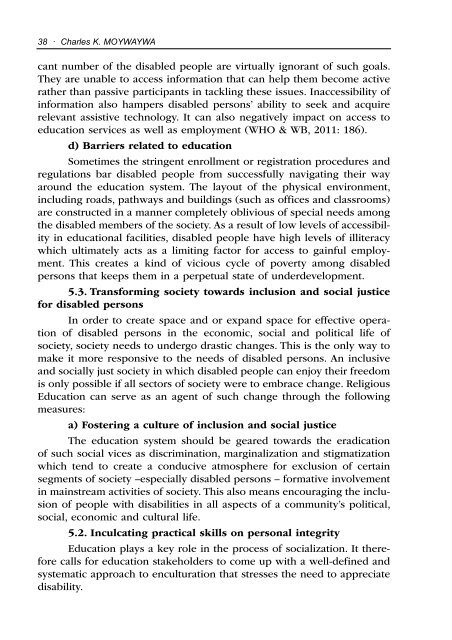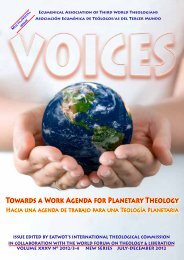voices-2013-2&3 - EATWOT's International Theological Commission
voices-2013-2&3 - EATWOT's International Theological Commission
voices-2013-2&3 - EATWOT's International Theological Commission
Create successful ePaper yourself
Turn your PDF publications into a flip-book with our unique Google optimized e-Paper software.
38 · Charles K. MOYWAYWAcant number of the disabled people are virtually ignorant of such goals.They are unable to access information that can help them become activerather than passive participants in tackling these issues. Inaccessibility ofinformation also hampers disabled persons’ ability to seek and acquirerelevant assistive technology. It can also negatively impact on access toeducation services as well as employment (WHO & WB, 2011: 186).d) Barriers related to educationSometimes the stringent enrollment or registration procedures andregulations bar disabled people from successfully navigating their wayaround the education system. The layout of the physical environment,including roads, pathways and buildings (such as offices and classrooms)are constructed in a manner completely oblivious of special needs amongthe disabled members of the society. As a result of low levels of accessibilityin educational facilities, disabled people have high levels of illiteracywhich ultimately acts as a limiting factor for access to gainful employment.This creates a kind of vicious cycle of poverty among disabledpersons that keeps them in a perpetual state of underdevelopment.5.3. Transforming society towards inclusion and social justicefor disabled personsIn order to create space and or expand space for effective operationof disabled persons in the economic, social and political life ofsociety, society needs to undergo drastic changes. This is the only way tomake it more responsive to the needs of disabled persons. An inclusiveand socially just society in which disabled people can enjoy their freedomis only possible if all sectors of society were to embrace change. ReligiousEducation can serve as an agent of such change through the followingmeasures:a) Fostering a culture of inclusion and social justiceThe education system should be geared towards the eradicationof such social vices as discrimination, marginalization and stigmatizationwhich tend to create a conducive atmosphere for exclusion of certainsegments of society –especially disabled persons – formative involvementin mainstream activities of society. This also means encouraging the inclusionof people with disabilities in all aspects of a community’s political,social, economic and cultural life.5.2. Inculcating practical skills on personal integrityEducation plays a key role in the process of socialization. It thereforecalls for education stakeholders to come up with a well-defined andsystematic approach to enculturation that stresses the need to appreciatedisability.





